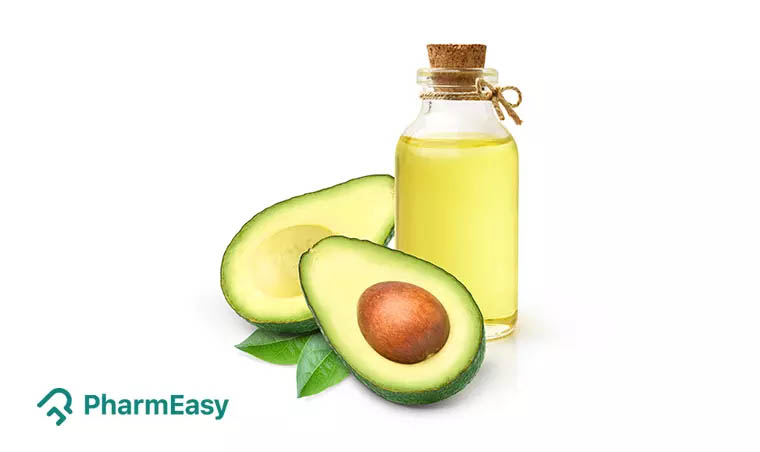Introduction:
Have you relished avocado toast or guacamole at a brunch party? Isn’t it amusing that oil extracted from the flesh of avocado fruit may have several benefits for health? The scientific name of avocado is Persea americana, which belongs tothe Lauraceae family. Avocado oil is extracted from avocado fruit by the cold-press method. Even 16th century literature has reported use of avocado oil. Avocado oil is highly popular in the cosmetic industry due to presence of high levels of vitamin E. Avocado oil is usually extracted from the Hass type of avocado which is grown in several countries like United States, Chile, Mexico, Spain, New Zealand etc.1,2 Let us look at some avocado oil health benefits.
Nutritional Value of Avocado Oil:
Avocado oil may contain several bioactive compounds like fatty acids, sterols, tocopherols, tocotrienols, phenolics, carotenoids, and chlorophylls.1 Additionally, avocado oil may contain the following components:
| Nutritional Component | Value |
| Energy | 884 kcal |
| Fats | 100 g |
| Fatty acids (saturated) | 11.6 g |
| Fatty acids (monosaturated) | 70.6 g |
| Fatty acids (polyunsaturated) | 13.5 g |
| Choline | 12-22.2 mg |
| Total chlorophyll | 13.3 g |
| Total carotenoids | 1.9 g |
| Lutein | 1.6 g |
| α-tocopherol (vitamin E) | 0.11 g |
| β-tocopherol (vitamin E) | 0.01 g |
| Sitosterol | 3.28 g |
| Neoxanthin | 0.2 g |
Table 1: Nutritional value of avocado oil1,3
Properties of Avocado Oil:
Some avocado oil properties are given below:
- It may lower bad cholesterol levels.4
- It may help in weight management.5
- It may regulate the blood pressure.6
- It may lower blood sugar levels.7
- It may protect the liver.8
- It may act against the microbes.9
- It may act against psoriasis.10
Potential Uses of Avocado Oil for Overall Health:
Some of the possible uses of avocado oil are:
1. Potential use of avocado oil to lower cholesterol
A study by Hernandez et al. In 2016 showed that avocado oil might be beneficial in reducing bad cholesterol levels- LDL (low-density lipoproteins) and total cholesterol. Avocados may possess cholesterol-lowering activities due to mono-unsaturated fatty acid (MUFA) and phytosterols.2 However, further studies are required to check if avocado oil may help to reduce cholesterol levels. Therefore, you must check your doctor in case of high cholesterol levels.
2. Potential use of avocado oil for managing weight
A study by Furlan et al. in 2017 showed that a diet including avocado oil might help to reduce the levels of triglycerides (harmful fats), which may help to lower the risk of obesity. Excessive fat accumulation in the body may lead to diseases like diabetes, hyperlipidemia, and heart disease; therefore, it is vital to maintain a healthy weight.2 However, further studies are yet to be done to check if avocado oil may help manage weight. Therefore, you must consult your dietician before making any changes in your diet.
3. Potential use of avocado oil for regulating blood pressure
In study conducted on rats showed that avocado oil might reduce blood pressure. This may be due to bioactive compounds like oleic acid, which may get incorporated into the cell wall and may control blood pressure.2,4 However, more studies on humans are required to confirm if avocado oil may be used to regulate blood pressure. Therefore, you must check your blood pressure regularly and consult your doctor in case of high blood pressure.
4. Potential use of avocado oil for diabetes
A study by Avila et al. in 2015 showed that avocado oil might help normalize total cholesterol and triglyceride levels (harmful fats) caused due to diabetes.2,5 Another study by Equihua et al. in 2016 showed that avocado oil might reduce insulin resistance Insulin is a hormone that may control the amount of sugar in the blood. With insulin resistance, the glucose might not enter the body cells and is built up in the blood. This may lead to high blood glucose levels. Additionally, oleic acid in avocado oil may help the secretion of specific proteins that can produce insulin.2 However, more studies on humans are required to confirm if avocado oil can be used in diabetes. Therefore, you must check your blood sugar levels regularly and consult your doctor in case of high blood sugar levels.
5. Potential use of avocado oil to protect the liver
A study by Pepa et al. in 2017 showed that fatty acids like mono-unsaturated fatty acids might help to protect the liver. Another study by Sato et al. in 2015 showed that tocopherols in avocado oil might help reduce oxidative stress on the liver.2,6 However, more studies are required in humans. Therefore, you must consult your doctor if you have any symptoms of liver disease.
6. Potential use of avocado oil for microbial infections
A study by Santos et al. in 2018 showed that avocado oil might act against gram-negative bacteria by penetrating through the cell walls of the bacteria. The anti-microbial property of avocado oil may be due to bioactive compounds like tocopherols, carotenoids, β-sitosterol, and terpenoids.2,7 However, large-scale studies are yet to be done. Therefore, you must consult your doctor if you suspect any bacterial infection.
7. Potential use of avocado oil for psoriasis
One of the features of psoriasis is the development of an itchy rash on the skin. A study by Stucker et al. in 2001 showed that topical application of a cream containing vitamin B12, and avocado oil might be beneficial for psoriasis.8However, more research is required to check if avocado oil may be used for psoriasis. Therefore, you must consult your doctor and not self-medicate if you have psoriasis.
Though studies show the benefits of avocado oil in various conditions, these are insufficient, and there is a need for further studies to establish the true extent of the benefits of avocado oil on human health.
How to use Avocado Oil?
Avocado oil can be included in the diet in the following way:
- It can be drizzled over a salad, soup, and vegetables before roasting.
- It can be used in smoothies.
- It can be used in hummus and mayo.
- It can be included in baked dishes.
You must consult a qualified doctor before taking avocado oil in large quantities or any herbal supplements. Do not discontinue or replace an ongoing treatment of modern medicine with an ayurvedic/herbal preparation without consulting a qualified doctor.
Side Effects of Avocado Oil:
Some clinical trials have shown that the following side effects may occasionally be associated with avocado oil:
- Avocado oil may cause contact allergy. It may cause dermatitis (skin irritation).
- On contact, avocado oil may also cause eczema (inflamed and itchy skin)9
You must immediately consult your doctor if you experience any side effects after consuming avocado oil.
Precautions to Take with Avocado Oil:
Avocado oil, being a natural substance is relatively safe to consume. However, as with all other substances, pregnant and lactating mothers shall be cautious before using avocado oil in any form. It is best to consult your doctor before doing so.
Interactions with Other Drugs:
Avocado oil may interact with warfarin, a drug that prevents abnormal blood clotting.10 You must consult your doctor before consuming avocado oil if you are undergoing any medical treatment.
Frequently Asked Questions:
Avocado oil may lower cholesterol, manage weight, regulate blood pressure, and protect the liver. It may act against diabetes, microbial infection, and psoriasis. However, you must consult your doctor if you have any disease instead of self-medicating.2,4-8
Avocado oil may contain bioactive compounds like oleic acid, linoleic acid, and palmitic acid which may help to keep the skin moisturized. It may also contain vitamin E, lecithin, and potassium, which may nourish and detoxify the skin. Phytosterols present in avocado oil may help to rejuvenate stressed skin.8
Avocado oil may contain fatty acids, choline, and vitamins E, carotenoids, sterols and many more.1,3
Avocados may lower bad cholesterol levels due to mono-unsaturated fatty acid (MUFA) and phytosterols like β-sitosterols. You must check your cholesterol levels regularly and consult your doctor in case of high cholesterol levels.2
Avocado oil may interact with warfarin, a drug that prevents blood clots.10 You must consult your doctor before consuming avocado oil if you are undergoing medical treatment for prevention of blood clots.
References:
This content was originally published here.

